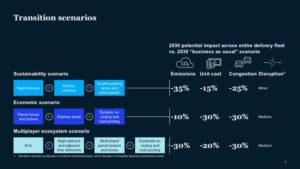COVID-19 is generating short-term disruptions and longer-term structural changes, with e-commerce experiencing soaring growth in categories like groceries and home care. Last-mile success will be tough, but getting it wrong could be catastrophic. Eric Hannon, Bernd Heid, Anja Huber, and Christoph Klink of McKinsey & Company present their vision in Automotive World.
Post COVID-19
While COVID-19 has amplified and accelerated online business (B2C), elevated e-commerce and time-definite delivery levels should remain above the pre-COVID-19 baseline in the long term. McKinsey predicts COVID-19 will accelerate digitization and electrification, drive the consolidation of the logistics and retail markets, lead to stronger traffic regulation, and foster new hybrid omni channel retail business models. They also believe COVID-19 will be a catalyst for contactless, unattended, and autonomous delivery technologies.
Scenarios
McKinsey developed interventions based on two different scenarios: an aggressive, highly regulated ‘mandated adoption’ scenario, and a more conservative ‘customer choice’ option that relies on the end-customer pull. They present three different transition roadmaps and believe taking an integrated ecosystem approach would optimize the last mile for both private and public players while minimizing customer disruption.
Private and public players have different aims that require different interventions. For example, cities and municipalities see reducing emissions, road safety, and traffic congestion as priorities, while logistics service providers want to reduce delivery costs and minimize disruptions in their current business models. The optimal transition roadmap scenario will align business priorities with ecological and social priorities and urge all stakeholders to take quick action.
Data sharing
In all scenarios, McKinsey believes that robust, harmonized regulations would help automotive manufacturers, logistics service providers, and tech companies better allocate R&D investments and accelerate the adoption of sustainable supply chain technologies. The use of data and advanced analytics is an enabler for interventions such as effective load-pooling and real-time traffic control. Joint data standards and effective data sharing are essential.
Investments
Fully implementing the ‘ecosystem scenario‘ would require investments of about €11.5bn by 2030 for a city with roughly two million inhabitants. These investments include an electric fleet transition, additional labor costs for night-time deliveries, the costs of installing and maintaining parcel lockers and boxes as well as multi-brand parcel shops, and costs associated with the development and licensing of smart V2X (vehicle to everything) connectivity solutions.
All last-mile ecosystem players are under tremendous pressure to act, but could also benefit from the changes ahead. Getting it right will be tough, but getting it wrong could be catastrophic. They encourage both private and public ecosystem players to tackle the problem one intervention and last-mile pilot at a time.
Source: Automotive World

